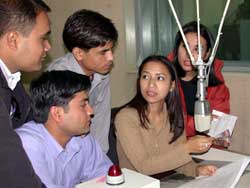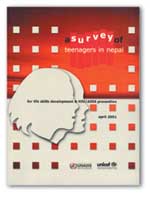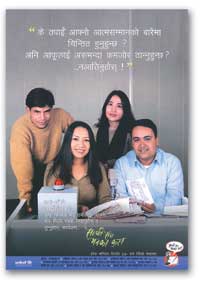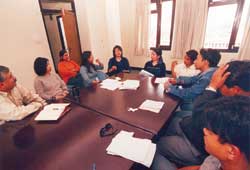 Most Nepali teenagers turn to friends rather than family members or teachers to talk about their private problems and share innermost thoughts. Parents are too squeamish to talk about sex, teachers are bound by taboos, and Nepali youngsters have nowhere to turn to except their peers.
Most Nepali teenagers turn to friends rather than family members or teachers to talk about their private problems and share innermost thoughts. Parents are too squeamish to talk about sex, teachers are bound by taboos, and Nepali youngsters have nowhere to turn to except their peers.
More than 80 percent of the teenagers in the nationwide survey conducted by UNICEF last year said they turned to their friends when they needed information on sexual matters. Only 10 percent approached their teachers, 10 percent of the girls said they talked to their sisters about these things. Parents came way down in the list: only 3.5 percent talked to their mothers, and even fewer, 1.4 percent asked their dads.
The survey showed teenagers worry mainly about having enough money, about their education, about getting a job, and they have lots of questions about love and marriage. Respondents in the survey were boys and girls between 12-18 years, and 22 percent of boys had already had sex, half of them with multiple partners. Only nine percent of the girls had sex, and among them 14 percent had got pregnant. The teenagers all had questions about sex and marriage, about sexually-transmitted diseases, about pregnancy, mastrubation and homosexuality. But they did not have a reliable and responsible source of information.
Now they do. Nepali teenagers have the one-hour radio programme, Sathi Sanga Man Ka Kura (Intimate conversation with friends) which is broadcast weekly on Radio Nepal and seven urban FM stations around the country and is already a runaway success. An indication of the popularity and success of the programme is the deluge of letters the production team gets from all over Nepal.  Sathi is produced for a target audience of teenagers, but there are queries from young adults and even 30-something women and men. Barely ten months after starting, Sathi is already getting 200 letters and emails every week, and the questions range form marriage, careers, friendship, pregnancy, extra-marital sex, and even incest and rape. Listeners in remote corners of Nepal have formed over 100 "listeners clubs" where youngsters gather around their shortwave radio sets on Saturdays at 3:30 PM to listen to the programme which carries an entertaining but informative radio drama, songs, and a half-hour letter answering session.
Sathi is produced for a target audience of teenagers, but there are queries from young adults and even 30-something women and men. Barely ten months after starting, Sathi is already getting 200 letters and emails every week, and the questions range form marriage, careers, friendship, pregnancy, extra-marital sex, and even incest and rape. Listeners in remote corners of Nepal have formed over 100 "listeners clubs" where youngsters gather around their shortwave radio sets on Saturdays at 3:30 PM to listen to the programme which carries an entertaining but informative radio drama, songs, and a half-hour letter answering session.
"Nepali youth are never encouraged to talk about sex, and they have little access to information. They worry, and have no one to turn to, " says 24-year-old Sushma Shrestha, the leader of the Sathi production team. The audience is encouraged to write about problems, which are discussed on air in the hope that it will benefit others with the same problems. Since the identities of the letter writers are protected, they find it easy to share secrets with Sushma's team which also includes Bhaskar Gyawali, Toya Ghimire, Sangita Budathoki, Devendra Shrestha and Bineeta Shrestha.
The production team meets at its office in Pulchowk every week to wade through hundreds of letters, mostly written in pages torn out of exercise books, picking out the most relevant ones which would benefit the maximum numbers of listeners with similar problems. The studio work is done at Radio Nepal which has
a separate team to produce the radio dramas.
 Last week, Bhaskar, Toya, Sangita and Sushma sat around the table, taking turns reading their choice of letters to the others. They ranged from a cry of help from a 21-year-old woman who had kept the secret of being raped by a relative when she was ten, and had finally mustered the courage to write to Sathi. She wants to know whether she should tell her husband if she gets married. (The team first commended her on her inner strength and moral courage, then weighed her pros and cons of telling her future husband, asking her to be careful about the unpredictable consequences on the male ego.)
Last week, Bhaskar, Toya, Sangita and Sushma sat around the table, taking turns reading their choice of letters to the others. They ranged from a cry of help from a 21-year-old woman who had kept the secret of being raped by a relative when she was ten, and had finally mustered the courage to write to Sathi. She wants to know whether she should tell her husband if she gets married. (The team first commended her on her inner strength and moral courage, then weighed her pros and cons of telling her future husband, asking her to be careful about the unpredictable consequences on the male ego.)
There was a letter from a 19-year-old college student from Syangja with the familiar problem of not wanting to get married to a boy the parents had chosen for her. She writes that she is not ready to get married, and asks for advice on how she should tackle her parents. (Sathi's advice: she needs to try to convince her parents that she is not yet ready to get married, but she also needs to understand why her parents are in such a hurry and develop her own counter-arguments.)
The production team discusses each problem in detail, trying to come up with the most helpful, most appropriate answers, and options least likely to exacerbate problems for the letter writer. All those around the table agree on the answers, list the points that have to be made. They try not to be prescriptive, or offer specific suggestions. More often than not, the answers try to tell letter writers to analyse their own feelings, look into the consequences of their actions, try to solve problems and not be rash or vengeful-all advice that would also apply to the daily dilemmas of thousands of other listeners all over Nepal.
When a particularly poignant letter is read out, team members look downcast and shake their heads. There is a long silence before the suggestions start coming in to help someone turn their life around. There is an attempt not to get too emotionally involved with the problems of letter-writers, to be rational and cool-headed. Which is also their advice: to find empathy, to exhort youngsters to be strong, self-confident and mature, to analyse a problem and think ahead to see if the solution is fair to all concerned, confront the real issue, don't shy away from a tough decision, be self-critical, talk things over with parents, try to understand why others act the way they do.
The sessions are intense, the team members let off steam by cracking jokes and laugh at some of their own problems. The team gets help from life-skills experts from UNICEF who help co-produce the program. "It's a program for young people produced by young people," says Toya, who at 27 is the oldest of the producers. "You really need to be a teenager to retain their interest on the program, and although I am already in my twenties, I am spiritually the youngest of member of this group."
It is not only the radio listeners who are relearning truths about sex. The member of the production team of Sathi have themselves come face-to-face with society's hypocrisies and double standards. They were shocked, for instance, too see how much issues like homosexuality, are swept under the carpet, and how prevalent incest actually is in our society.
But the team has to tread a fine line. State-owned Radio Nepal has its own norms that it can't overstep. The programme is a complete departure from the usual fare on Radio Nepal.
"From the feedback there is tremendous and unprecedented response," says Rajendra Sharma of Radio Nepal. "We are not censoring content, it's not what we say but how we say it. The content should not be overtly vulgar, otherwise we have no objection to sober analysis of even issues like masturbation or homosexuality."  Says one of the producers, Sangita Budathoki: "Before we started Saathi, I never imagined Nepalis had sex at such a young age. This means they are vulnerable because of the dangers of unprotected sex." There are more than 33,500 Nepalis who have HIV, and AIDS is going to be the number one killer of Nepalis in the 15-49 age group by the year 2010.
Says one of the producers, Sangita Budathoki: "Before we started Saathi, I never imagined Nepalis had sex at such a young age. This means they are vulnerable because of the dangers of unprotected sex." There are more than 33,500 Nepalis who have HIV, and AIDS is going to be the number one killer of Nepalis in the 15-49 age group by the year 2010.
Nearly 60 percent of people with HIV are under 30 and nearly 10 percent adolescents. A Family Health International (FHI) study conducted among 800 youths reveals more than 71 percent of them had their first sexual encounters before age of 19. Despite awareness of condom use and safe sex practices, Nepali youths are still having unprotected sex, according to the FHI survey.
"Nepali youth are concerned and alert, they want to achieve something in life, but they don't have too many people to counsel them or give them guidance on personal, private matters. They are confused and frustrated, and turn to drugs and unprotected sex," explains Bhaskar.
It is the dramatic rise in injecting drug use in urban centres and its combination with unprotected sex that is most worrying. One recent survey puts the number at anywhere up to 60,000 and they are in the 16-25 age bracket. More than half of them are already HIV positive, and many of those have multiple sex partners. This almost guarantees the spread of HIV and infections like Hepatitis B into the general population.
"Communications is the first line of defence," says UNICEF's Wing Sie Cheng, who oversees the Saathi project. "Our objective is to teach Nepali youth about life skills, the set of core abilities that enable young people deal with the demands and challenges of everyday life." UNICEF identifies ten interdependent skills like self-awareness, communication, interpersonal relationships, decision making and problem solving as the life skills. The survey of teenagers showed that more than 90 percent of Nepali teenagers had a clear goal in life, and they could articulate their biggest worries and fears.
Sathi Sanga Man Ka Kura is broadcast every Saturday 3:30-4:30 PM on Radio Nepal national network on medium wave and shortwave. It is rebroadcast during the week on the following FM stations: HBC 94 FM Kathmandu, Hits FM 92.1 Kathmandu, Classic FM 100 Kathmandu, Kosi FM 93.4 in Biratnagar, Lumbini FM 96.8 in Butwal, Annapurna FM 93.4 Pokhara, and Swargadwari FM 102.8 in Dang.
Catmandu is broadcast on Saturdays at 7:00-7:30 PM on Nepal Television.
Email: [email protected]
By teaching life skills as a generic everyday ability, Cheng says listeners will be groomed to be emotionally independent, confident and able to tackle other problems in life.
"These are learnable skills, and these skills make huge differences on how you perceive yourself and your attitude towards life," says Bineeta Shrestha, who says producing Sathi has helped her become more focused and less confused about her own priorities. Bhaskar says he learnt to cope with his emotions, Sangita says she learnt self-awareness and gained decision making abilities, while Toya thinks he's more positive about life and now realises that sharing problems with others can help find a better solution.
Says Cheng: "In a very short time, Sathi has become one of the most popular youth programmes on radio, we hope to build on this." A television version of the programme, called "Catmandu" and broadcast every Saturday on Nepal TV has also been launched. This Nepali edu-tainment by radio is unique even by international standards, and is already being talked about as an initiative comparable to South African television's highly-rated Soul City. In future, Sathi Sanga Man Ka Kura hopes to be even more interactive and more responsive to more listeners also in rural areas.


